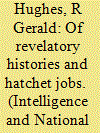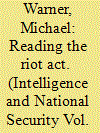| Srl | Item |
| 1 |
ID:
085085


|
|
|
|
|
| Publication |
2008.
|
| Summary/Abstract |
This article explores a number of issues in the contemporary study of intelligence. These issues are methodological (relating to engagement with 'primary' sources), epistemological (concerned with notions of 'bias' and objectivity), and presentational (dealing with how scholars locate their work within existing debates). The article will contend that the study of intelligence, largely because of its ambiguous positioning on the borderland between political science and history, has been somewhat isolated from the debates over theory and method that have flourished in the wider historical discipline in recent decades, and that an engagement with such literature will yield commensurate benefits. Finally, the article will explore the place of intelligence history within the wider discourse of 'popular' history. Given its potentially sensational content, some intelligence literature is targeted at a 'popular' readership, but many of the claims made in authoring, promoting and reviewing such books are highly problematic. Since this is inimical to scholarly rigour, and is unlikely to facilitate wider public understanding of major historical issues, such matters need to be addressed
|
|
|
|
|
|
|
|
|
|
|
|
|
|
|
|
| 2 |
ID:
089627


|
|
|
|
|
| Publication |
2009.
|
| Summary/Abstract |
The difficulty of satisfying competing needs of both national and sub-national officials and commanders for intelligence support capabilities that are too sensitive and expensive to duplicate for both sets of requirements emerged with the growth of industrial-scale imagery and signals intelligence assets and production during the Cold War. The literature of intelligence history and intelligence studies covers the symptoms of this problem, but says less a rigorous and well-documented nature on its causes. Thanks to recent declassifications in the United States, however, we can now read key documents in an American attempt to understand and deal with the dilemma. A study prepared for President Richard Nixon in 1971 and now dubbed the 'Schlesinger Report' has been published virtually intact by the US Department of State. In addition, the Central Intelligence Agency has released two official histories which indirectly have added significant detail to the story. With these new releases, it is now possible to explain the genesis of the Report and chart its effects through the remainder of President Nixon's presidency. The Schlesinger Report marked a watershed for the intelligence community, helping the Nixon Administration to conceive and enact reforms that were both consequential in themselves and presaged the findings of later surveys and inquiries. A better understanding of the Report's background, text, and results can shed light not only the policymaking process in the Nixon Administration but also the trajectory of the intelligence community - and of foreign intelligence establishments that may, in some respects, be following in its path.
|
|
|
|
|
|
|
|
|
|
|
|
|
|
|
|